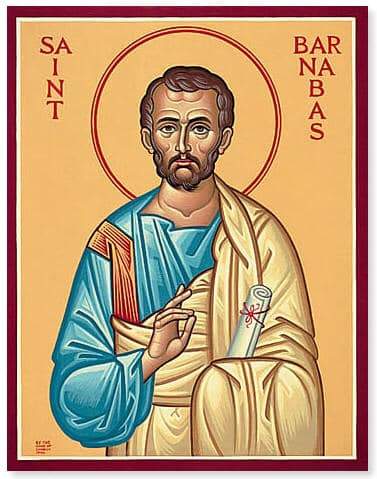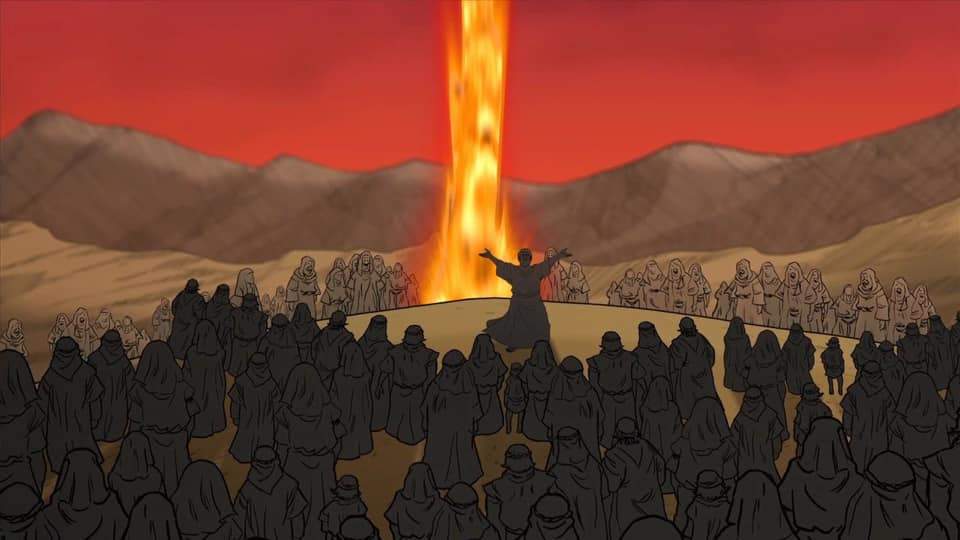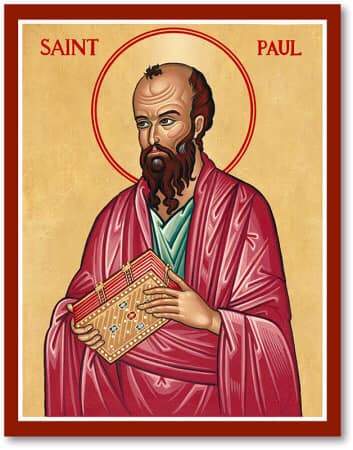Homily for Thursday of the 10th Week in Ordinary Time, 11 June 2020, Mat. 5:20-26
Today is the Feast of the Holy Apostle and Martyr, St Barnabas. If you have been following this Online Mass and paying close attention to our past readings from the Acts of the Apostles, you should be familiar to this great figure of the Church by now. But let me tell you a little bit more about what I believe to be the greatest contribution of this man that would significantly change the course of the history of Christianity: his faith in the conversion of Saul or Paul of Tarsus, who, along with St. Peter, is now regarded a Great Pillar of the Church. Peter, the Apostle to the Jews, and Paul, the Apostle to the Gentiles.
Today’s first reading tells us Barnabas was sent by the mother Church in Jerusalem to Antioch in Syria, in order to help in getting the young Church better organized. St. Luke tells us it was at Antioch where the disciples of Jesus were first called CHRISTIANS. This was actually a negative or pejorative term. “Christians” meant a fanatical sect of Jews who worshipped a criminal as their Lord and Savior.
Remember, most of them were Jews who were later expelled from the Synagogues for proclaiming that their Rabbi (Teacher), the carpenter from Nazareth who was crucified by the Romans, rose from the dead, and that he was not only the Messiah or Christ the Jews had been waiting for, but the Son of God.
The Christians at Antioch were rapidly growing in numbers and they needed some help. And Barnabas knew where to get it from—namely, from the very man who used to persecute them, the man who had caused many of them to be arrested and executed. Of course we also know through the narration of St. Luke that this man eventually got converted through a direct intervention of the Resurrected Jesus himself—once, when he was on his way to Damascus. St. Luke also tells us that, after his conversion, it was Barnabas who endorsed Saul to the apostles in Jerusalem. But Saul was too controversial and was causing so much negative reaction, they sent him back to his hometown in Tarsus.
I have a feeling that the Jerusalem community did not know what do with him or how to deal with him. They have not yet forgotten how he used to persecute them. And now he would suddenly come out claiming he had also become a follower of Jesus? Of course they would remain cautious with him. In their minds, I am sure they were suspecting that he could have been planted by the Sanhedrin to spy on them. He could be an undercover agent of the Romans who was posing as a convert so that he could penetrate the communities that were operating underground. In short it was too much of a risk to trust this man.
And so you see, there was Saul of Tarsus, a new convert, a changed man called by Jesus himself, but who remained unwelcome, unaccepted by the Early Christians in Jerusalem. What other choice did he have than to return to his home in Tarsus? Perhaps his own fellow Pharisees did not even trust him anymore. In short he found himself totally isolated and ostracized.
Now, who would think of paying him a visit in Tarsus? BARNABAS. It is Barnabas who would bring him personally to Antioch. It is Barnabas who would do eveything to heal the wounds and to get Paul reconciled with the community he had once persecuted. I imagine Barnabas taking very seriously what Jesus said in today’s Gospel, that if you are at odds with your brother, you better leave the gift and go and first be reconciled with him first. I wonder what acts of penance Saul had taken upon himself in order to convince the Christians that he was for real, that he was sincere, that he was no no longer their enemy but their brother and fellow disciple.
If I were to find him a parallel in our times, perhaps you can imagine a former death squad leader leaving his job, and because he is haunted by his conscience, he goes out of his way to visit the families of his former EJK victims and seek their forgiveness. Imagine him even volunteering to serve them?
We have to give credit to Barnabas for this great achievement. Not only does he succeed in reconciling Saul with the Christians at Antioch, he even taps the help of Saul to be part of the mission team that is about to be deployed by the Church at Antioch to Asia Minor.
In Saul, Barnabas had discovered a prodigy, a potential prophet and teacher, a fellow apostle, the one who would open the doors of the Early Church to the Gentiles, and that includes all of us. I hope you see how deeply indebted we are to this great man.
The point is, the Church never closes its doors to anyone, not even its worst enemies. Why? Because we stubbornly believe that nobody is beyond redemption. You will never know how God can still change people’s hearts, how he can strike the proud down and make them eat the dust. How he can blind them so that later, they could see better. How he can effect 180-degree turn in the lives of people like Paul, who, from being a persecutor would become the biggest propagator of the Christian faith.
A few days ago, I was just talking to a religious priest who was a former drug addict. He shared to me his story—how he got rehabilitated through the intervention of people who truly cared for him. Now he is very much involved in the ministry of rehabilitating addicts and opening the doors of the Church to homeless people. I imagine the seminary formator who believed in him, and who accepted him for religious formation in spite of his background. I used to be in the seminary formation team myself. I know of colleagues who would be more cautious with people with such a background. Even people in corporate business rely very much on TRACK RECORD.
Christianity believes in CONVERSION. St Barnabas did. And look what a huge blessing it has brought to the Church. It paved the way for a global Christianity.







